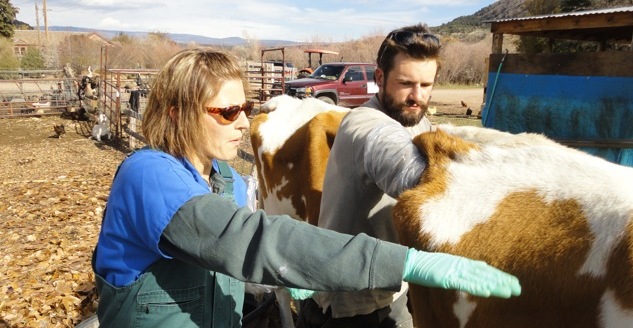Stewardship Training
Sustainable Settings is not purely a farm or ranch. It is a hybrid – a working ranch and whole systems learning center. We engage all our senses here. We research, work, think, laugh, discuss, and find solutions leading us to a saner daily life.
Sustainable Settings fosters intensified learning-working in the various field areas the Whole Systems Learning Center. To accomplish this we have established a limited number of Stewardships, two to four people at any one time. This is a one year commitment. Stewards may be offered additional time in the program upon completion of their internship, at the discretion of the Director and contingent on performance, and funding.
Sustainable Settings’ Stewardship is a subsidized learning situation. Subsidized in the sense that at this point your tuition dollars only cover about half of the costs of you being here. Stewards are temporary staffers who come to Sustainable Settings after completing advanced study (ordinarily they hold a bachelors or graduate level degree, or have equivalent experience in their area of emphasis) and now wish to apply and expand their knowledge and skills. Stewards have exceptional reading and writing skills, a strong interest in sustainability and culture issues, a high degree of self-motivation, and a desire to apply themselves to practical problems.
The Steward’s responsibilities include project-specific hands-on research and demonstration in sustainable agriculture, on-site green building, report writing, general office work, leading site tours, educational offerings and assisting in the development and upkeep of Sustainable Settings’ facilities and grounds. Daily tasks can include such activities as reading, writing, talking to others in related fields of expertise, designing, building, gardening, animal husbandry, working on value-added products, marketing, Web site development, helping with programming and fundraising, mentoring students from area schools, and occasionally helping/volunteering in the greater Roaring Fork Valley community. i.e. making costumes and sets for a local elementary school’s spring musical, volunteering for Carbondale’s Potato Days, and/or designing, building.
It is taken for granted that Stewards are extraordinarily able. Much of getting along in the world goes beyond this. Hard work is not enough. Personal qualities such as initiative, empathy, adaptability, flexibility, and persuasiveness are also necessary.
Stewards joining Sustainable Settings understand that:
- They are responsible for their own learning. There are no gurus at Sustainable Settings. The Director and permanent staff focuses on managing the overall development of the organization and Whole Systems Learning Center. If interns need help with their progress and/or learning, they are expected to seek assistance from the permanent staff. If the permanent staff do not have the knowledge or time, they will help the interns to find expertise appropriate to their current endeavor.
- At any time, due to Sustainable Settings’ changing priorities, local politics, regulatory hold ups, or lack of funding, the Stewards may not be able to pursue exactly the things they came to learn.
- Although they may be responsible for all or part of the research and development of a particular project, they may not be able to see that project to completion during the Stewardship training, and that project may be re-assigned, delayed, or cancelled.
- Stewards do not come to Sustainable Settings to accumulate money. This is at best a subsidized learning experience. For the first seven months interns are unpaid volunteers. During this initial period each intern is responsible for all of his or her living expenses. After one yearStewards and the Director meet to determine if another period would be beneficial to both the Steward and the organization and set the parameters for that period. Each Steward is strongly encouraged to arrive with $3,000-$4,000 in her/his personal bank account for housing, food, and personal expenses.
- Housing is provided to most Stewards. We can currently provide limited housing on a first come first serve basis. Limited camping until housing is found is available. Otherwise Stewardss are responsible for obtaining their own housing off-site. Unfortunately, housing and food costs in the Aspen/Carbondale area are expensive and must be paid for by each intern. For example: a one bedroom apartment or room in a shared two-bedroom home can rent for $700 per month.
- Stewardships vary in the different areas of the organization. For instance, Sustainable agriculture focused Stewards may have a different arrangement than green building focused Stewards. Although there are basic understandings and agreements between all interns and the permanent staff, as in most aspects of life, individual Stewardships are negotiated between the Steward and the Director.
- Scholarships are a possibility to help offset costs of living during the Stewardship period. Interested applicants may contact the Director for more information
Sustainable Settings offers two to three Stewardships per year. Stewardships are built around the whole systems approaches that guide the dynamic integration of sustainable strategies on the ranch.
Stewards, though working predominantly in an area of emphasis (organic farming, green building, renewable energy, sustainable community development, etc.), collaborate and study in all areas of Sustainable Settings during their internship.
How to make it happen…
To apply for upcoming Stewardships send an introductory email, resume, a statement of intent, and a list of three references with addresses and phone numbers (Please no letters). Email attachments are accepted. We will review your email and get back to you to set up a phone interview. Give us a week or so to respond to your email, if you don’t hear from us PLEASE call 970-963-6107.
*Once you have been accepted and arrive at the ranch all interns will be required to sign a release of all claims.
EMAIL: info@sustainablesettings.org

